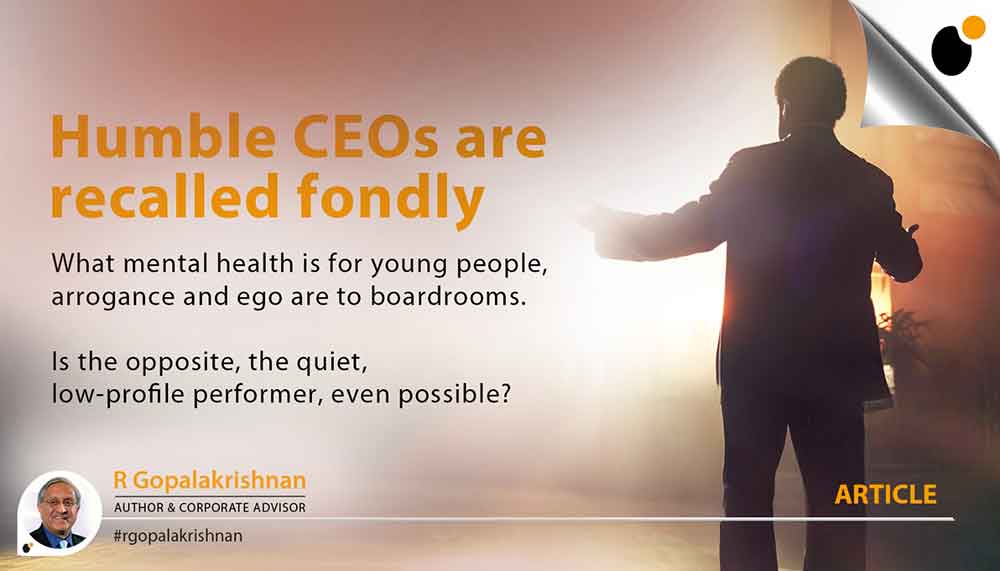27th September 2018 BUSINESS STANDARD
R. Gopalakrishnan*
(*The writer is a corporate advisor and Distinguished Professor of IIT Kharagpur. His new book, co-authored with Ranjan Banerjee, and titled “THE MADE-IN-INDIA MANAGER”, will be published by Hachette India in November, 2018.
Email: rgopal@themindworks.me
Critics disapprove my views on startups as expressed in my Innocolumn—against dual class shareholding (BS, 15th Aug), apprehension about government protection for startups (BS, 2nd March) and questioning how much real impact startups can have in the near term (BS, 15th Sep 2017). To state my view, I am emphatic that startups are good for India. I worry about the hubris around startups as though they are the magical solutions to issues of economic growth and job creation. I worry that many Indian startups are born to be sold. (Worth reading a paper by Christian Livi and Hugues Jeannerat in Maison D’Analyse des Processus Sociaux in 2014).
I call a spade a spade, but some feel that what I call a spade is not a spade at all–an opposite view is fine. Viewing startups as ‘growing children’ in our economic ecosystem, I wonder whether the children are growing alright, especially the ecommerce variety. There exist gullible infatuations, even at Silicon Valley, like Theranos and Juicero, more about these in the next column. After all, history is full of narratives about smart people collectively doing foolish things.
My questions: is there too much froth about and at startups? Are many of the startups sustainable?
Here is why I am apprehensive. Trading and manufacturing economics are based on a centuries-old principle: for the investment of capital by an owner, there is revenue greater than cost, leaving some profit. To sustain the business (a new product or solution with a perceptible consumer benefit), competitive advantage must exist. Aware of the mortality of their business, owners aim for a quick recouping of their invested risk capital, depending on the nature of the business. It is this principle that is being torture-tested with the new players articulating, though not demonstrating, that the winner takes all. It is despairing to see a statement from the CEO of one most successful startup that his owners do not care about profit, they are only interested in market share! For how long? He is depending on muscling out others! Capital gets touted as a competitive advantage! The idea of predatory pricing is not new and firms have experienced that during the last century, attracting laws like anti-trust and monopolies control.
The startups of the 1980s and 1990s, like Infosys and Bharti, aimed to make a profit within 7-8 years—and they did do so. The technology startups born from 2001 onwards are estimated to have attracted investment of about Rs 300,000 crores ($ 45 billion). Cheered on by the media, and adorning awards juries and national economic advisory councils, some entrepreneurs are celebrities, having earned an incredible amount of money in a very short time–kudos to them and good luck. With two arguable exceptions–Flipkart (Walmart parent) and MakeMyTrip (Chinese CTrip)–the question lingers: has any founder built a sustainable enterprise? Most have become rich like equity traders (no disrespect intended).
The acid test will be when their current financial investors want to exit. Will the companies be acceptable to the capital market for an IPO? Or to a long term strategic investor? Current business models don’t give confidence and the mortality rate could well be huge.
Over 17 years since 2001, I don’t know if even one of the Indian startups has reached a positive cash flow status with a modicum of stability. If a bunch of traditional companies failed to turn in a sustainable positive cash flow, would not alarm bells ring? Such companies become defaulters in due course, as the Indian economy is painfully experiencing. FMCG companies invest cash in advertising upfront, but the better companies maintain a tight vigil on its efficiency and returns. With many of the successful technology startups, the end of the dark tunnel is not visible. It is this old-fashioned concern that I am expressing.
The Indian startup movement cannot yet be classified as successful. When achieved, success can stimulate the economy through new consumer experiences and job creation. It will inevitably bring with it surprises and downsides. One such downside is hubris. Nobody wishes to miss this startup party because the grooving and music arising out of technological changes and opportunities confirm that a lively party is afoot. There needs to be more introspection and discipline regarding the outcome of this party.
National economic benefit is not only about creating wealthy entrepreneurs, but about creating long-living companies.


